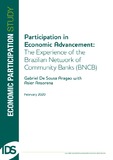| dc.contributor.author | De Sousa Aragao, Gabriel | |
| dc.contributor.author | Ansoren, Asier | |
| dc.date.accessioned | 2020-02-10T12:29:26Z | |
| dc.date.available | 2020-02-10T12:29:26Z | |
| dc.date.issued | 2020-02 | |
| dc.identifier.citation | De Sousa Aragao, G. with Ansorena, A. (2019) Participation in Economic Advancement: The Experience of the Brazilian Network of Community Banks (BNCB), Brighton: IDS | en |
| dc.identifier.isbn | 978-1-78118-597-1 | |
| dc.identifier.uri | https://opendocs.ids.ac.uk/opendocs/handle/20.500.12413/15101 | |
| dc.description.abstract | This case study was designed to investigate how people in poor communities in Brazil are taking action to improve their local economies and how participation is important to achieve that. In a context of economic marginalisation and limited access to infrastructure and public goods, local movements have risen in which residents organise themselves to discuss major community issues and try to find a solution together. The experience of Banco Palmas, the first Brazilian Community Development Bank (CDB), inspired the spread of this model across the country and resulted in the creation of the Brazilian Network of Community Banks (BNCB). By definition, CDBs are grass-root initiatives developed and managed by the community, working for the community, based on solidarity economy principles. The purpose of the BNCB is to exchange experiences, advocate for solidarity economy, articulate policies and partnerships, and to support the creation of new CDBs. Building from the experience of Banco Palmas, this study endeavours to understand the role of participation as a fundamental component of CDBs, and how it has been encouraged and promoted by the BNCB. The findings are based on a series of interviews with CDB representatives, the BNCB, the Brazilian government and other experts working in this area, as well as a comparison of the experiences of three CDBs: Banco Estrutural, Banco Mumbuca and Banco Palmas itself to understand the relevance of community engagement and ownership over the banks, as well as the significance of external partners for their survival. While the BNCB has become a national reference for establishing new CDBs based on participation, other factors including the origins of the CDBs, the effectiveness of their communication, their ability to reach beyond an activist base and their financial sustainability strategy are key to CDBs enabling participation. | en |
| dc.description.sponsorship | Open Society Foundations | en |
| dc.language.iso | en | en |
| dc.publisher | IDS | en |
| dc.rights.uri | http://creativecommons.org/licenses/by-nc/4.0/ | en |
| dc.subject | Finance | en |
| dc.title | Participation in Economic Advancement: The Experience of the Brazilian Network of Community Banks (BNCB) | en |
| dc.type | Series paper (IDS) | en |
| dc.rights.holder | © Institute of Development Studies 2020 | en |
| rioxxterms.funder | Default funder | en |
| rioxxterms.identifier.project | Default project | en |
| rioxxterms.version | NA | en |
| rioxxterms.funder.project | 9ce4e4dc-26e9-4d78-96e9-15e4dcac0642 | en |


